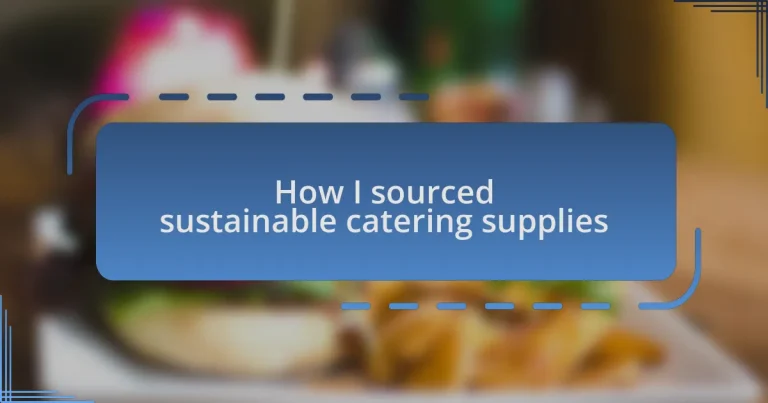Key takeaways:
- Olivia Hartwell emphasizes the empowering impact of choosing sustainable vendors and the significance of personal connections in sourcing supplies.
- The article highlights the importance of sustainability as a collective responsibility and its positive effects on community connections and brand image.
- Researching local suppliers and building strong vendor relationships can transform sourcing practices into meaningful collaborations that enhance quality and promote shared values.
Author: Olivia Hartwell
Bio: Olivia Hartwell is a contemporary fiction author known for her compelling narratives and vivid characterizations. With a background in literature and creative writing, she has a keen eye for detail and a passion for exploring the complexities of human relationships. Olivia’s debut novel, Whispers of the Heart, received critical acclaim and was nominated for several literary awards. When she’s not writing, she enjoys hiking in the mountains of Colorado and sipping artisanal coffee at local cafes. Olivia resides in Denver with her beloved rescue dog, Rosie.
Understanding sustainable catering supplies
Sustainable catering supplies are essential for anyone looking to make environmentally responsible choices. I remember my first experience sourcing eco-friendly materials; I was amazed to realize how many options were available. It sparked a journey for me—could I truly align my business practices with my values while still providing high-quality service?
When we consider sustainable supplies, it often means focusing on biodegradable or compostable options, while also ensuring the sourcing of ingredients is ethical. I once encountered a supplier whose practices not only aimed to minimize waste but also supported local farmers. This connection touched me deeply, as I could see the direct impact of my choices on the community. How empowering it felt to know that by choosing wisely, I was making a difference!
It’s not just about reducing our carbon footprint but embracing a holistic approach to catering that values our planet and our clients. Have you ever thought about the story behind each product you use? Realizing that every sustainable choice tells a story—of commitment, care, and connection—enriched my experience and enhanced the way I serve my customers.
Importance of sustainability in catering
Sustainability in catering isn’t just a trend; it reflects a growing awareness of our collective responsibility toward the environment. I recall a moment at one of our events when a guest approached me, expressing gratitude for our choice of sustainable supplies. That conversation was a turning point, making me realize that people care deeply about the origins of their food and the impact of their choices. It’s truly heartening to recognize how our decisions can resonate with customers on such a personal level.
The impact of sustainable practices extends beyond just environmental benefits; it fosters a genuine connection between our brand and our community. I took a step further by collaborating with local artisans to create custom packaging that echoed our commitment to sustainability. The pride in showcasing their craftsmanship alongside our products transformed not just our offerings, but also the relationships we built. How incredible is it to support those around us while enhancing our brand image?
Moreover, embracing sustainability often leads to innovation and creativity in menu design. I’ve found that when I focus on seasonal, locally-sourced ingredients, my dishes not only taste better but also tell a rich, vibrant story of the locale. It’s fascinating to think about how each meal can be a reflection of the environmental choices we make. Isn’t it a beautiful thought that with every burger I serve, I’m also serving a bit of love for the planet?
Criteria for selecting sustainable vendors
Selecting sustainable vendors requires a careful consideration of several key criteria that align with our values. For me, the first priority is sourcing from suppliers committed to ethical practices. I remember an enlightening conversation with a local farmer who shared the labor and care that goes into their organic produce. It’s those stories behind the ingredients that resonate with me and make the choice feel substantial.
Another critical factor is transparency in the sourcing process. I’ve learned that vendors who openly share where their materials come from are usually the ones genuinely dedicated to sustainability. Recently, I switched to a paper supplier who not only provided biodegradable products but also detailed their waste reduction processes. It’s reassuring to know that my choices are made in partnership with vendors who share the same ethos.
Finally, I prioritize vendors who demonstrate a commitment to continuous improvement and innovation. I once partnered with a company that was developing sustainable packaging made from plant-based materials. Their enthusiasm for pushing boundaries inspired me and reassured me that I wasn’t just buying a product but also supporting a vision for a better future. It sparks a sense of hope, doesn’t it, when our choices can drive positive change beyond just our immediate needs?
Researching local sustainable suppliers
Researching local suppliers for sustainable catering was an eye-opening experience for me. I recall scouring the local farmers’ market, chatting with the vendors about their growing practices. Those conversations not only provided valuable insight but also sparked connections that felt deeply personal. Who wouldn’t appreciate knowing the story behind the food they serve?
I also took to online platforms to explore further, reading reviews and checking sustainability certifications. It was a relief to discover several suppliers who not only met but exceeded my expectations in environmental responsibility. One vendor even had a community garden initiative that galvanized local involvement; it made me ponder how we can support our community’s growth through conscientious purchasing.
Engaging with these suppliers often revealed unexpected layers of commitment. I remember visiting a small dairy farm where the owner passionately discussed her practices for animal welfare and resource conservation. It left me wondering how many other incredible stories like hers are out there, waiting to be found. By investing time in research, I realized I wasn’t just sourcing supplies—I was becoming part of a larger movement toward sustainability.
Building relationships with vendors
Building relationships with vendors is a crucial step in ensuring that our catering practices align with sustainable values. I recall one particular vendor who stood out during my quest. As I cultivated a rapport with her, she opened up about her commitment to organic farming. This wasn’t just a business transaction; it felt like a partnership built on shared values. Have you ever experienced that warmth when you realize you’re working with someone who genuinely cares?
As I spent more time with my chosen suppliers, I began to grasp the significance of trust in our interactions. One time, I found myself at a local olive oil producer’s facility, where we discussed options for sourcing their products. I was impressed when he asked for my input on their blends, making me feel valued. It was a reminder that nurturing these relationships can lead to better product quality and even exclusive offerings that benefit our gourmet creations.
The emotional connections formed through these interactions can’t be understated. One vendor, after learning about our mission, reached out to offer a seasonal discount on her produce, recognizing our efforts to provide sustainable choices. I wasn’t just a customer to her—I became a collaborator in a shared vision. Have you ever felt that thrill of being part of something bigger? That’s the power of building lasting vendor relationships.
Personal experiences in sourcing supplies
One pivotal moment in sourcing sustainable supplies occurred at a farmers’ market. I remember stumbling upon a stand with vibrant, heirloom tomatoes. After chatting with the farmer about his growing practices, I left not just with groceries, but with stories about his family and traditions. It struck me then: wouldn’t it be remarkable if more suppliers shared their stories? These personal connections turn mundane transactions into meaningful exchanges.
During a particularly busy week, I reached out to a newly discovered supplier of artisan cheeses. I was pleasantly surprised when she didn’t just send a catalog of options but instead took the time to call me and discuss my vision for our menu. It was refreshing to find someone who truly invested in understanding my needs. Have you ever had a vendor who went the extra mile for you? That experience taught me that sourcing supplies isn’t merely transactional; it’s about collaboration and creativity.
Another time, while researching local grain suppliers, I visited a small mill that had been in operation for generations. The miller shared his passion for heritage grains and showed me how he sourced them sustainably. Listening to him speak lit a fire in me about the entire food supply chain. It made me wonder: how often do we overlook the stories behind our ingredients? Embracing these narratives not only enhances my offerings but also deepens my commitment to sustainability.


